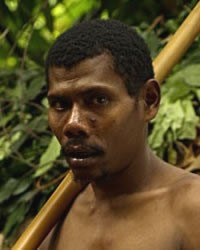Kensiu in Malaysia

Photo Source:
Kennedy Paizs / Wirot Si Prom
|
Send Joshua Project a map of this people group.
|
| People Name: | Kensiu |
| Country: | Malaysia |
| 10/40 Window: | Yes |
| Population: | 400 |
| World Population: | 700 |
| Primary Language: | Kensiu |
| Primary Religion: | Ethnic Religions |
| Christian Adherents: | 1.30 % |
| Evangelicals: | 0.00 % |
| Scripture: | Translation Started |
| Ministry Resources: | No |
| Jesus Film: | No |
| Audio Recordings: | No |
| People Cluster: | West Malaysia Indigenous |
| Affinity Bloc: | Malay Peoples |
| Progress Level: |
|
Introduction / History
The Kensiu are one of the nineteen Orang Asli ethnic groups living in Peninsular Malaysia. They are classified under the Semang (officially called Negrito) category.
Their language is very close to that of the Kintaq, another Orang Asli tribe with whom they share settlements and have close socio-economic relations. The Kensiu are closely related to the Kensiu of Thailand, and cross-border movement is frequent. The Kensiu's main settlement is in the Baling district of Kedah. A few of the Kensiu can be found living in Perak and Kelantan.
What Are Their Lives Like?
Racial prejudice from neighboring people groups has caused the Kensiu to avoid contact with outsiders. However, contact with the outside world has brought not only slight improvements in living standards but also changes that are stressful for many. Attempts by the government to modernize the Kensiu have caused drastic changes to their traditional lifestyle, with the infiltration of alien belief systems and values. Many Kensiu find it difficult to cope and have found this transition traumatic.
Kampong Baru Siong is one such settlement located in the Baling district of Kedah. There is very little activity in this small village, which contains approximately 50 houses, a school and a community hall. Many houses appear vacant. The community hall is on the verge of collapse. A few cows and goats graze in a field located within the vicinity of the village. Attendance at the primary school is low.
Many of the settlers have returned to the jungle area along the Malaysia-Thailand border. There they take forest products such as rare wood, resins, honey, and herbs to the nearest Thai market to exchange for salt, knives, tobacco, cloth, and other necessities from the modern world. Occasionally, they return to the village but stay for only a short period of time. They are not motivated to attend school. Possibly, they have associated the word "school" with the Malays, whom they have rejected. This apathy to public education has been reinforced by teachers urging them to study Islamic education. Those who live in this village do not permit intermarriage with people outside the community. They marry only their cousin Kensiu living in Thailand or people of the Kintaq community. Those who marry outsiders must move out of the village.
What Are Their Beliefs?
Despite inroads made by Islam, ancient beliefs remain strong in their society. One unique feature of the Kensiu is their Dikir Barat - a rare unique form of singing, which is performed only at important gatherings.
Their philosophy is, "Blessings are for today. Tomorrow is tomorrow's matter". They believe that nature will give blessings. Although they do not believe in any god, they believe the presence of spirits reside in places like bridges, and graves and trees.
What Are Their Needs?
In fast developing Malaysia, the Kensiu need incentives to improve their standard of living. Their habit of nomadic living makes it difficult to reach them with any education or skills training.
Prayer Points
Pray for resourceful believers who will take the necessary time and make the sacrifices to help this small, remote group of people.
Pray that local believers will relate and respond to each of the needs of these people.
Pray for the Kensiu people to have the spiritual hunger it takes to embrace the King of kings no matter what the cost.